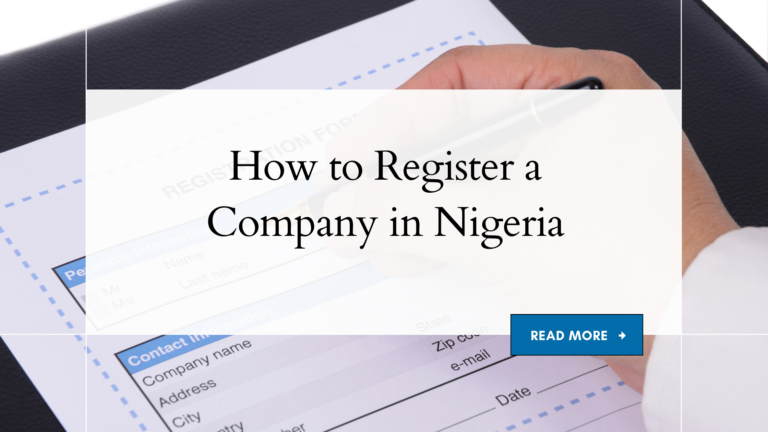Until recently, Nigeria used to be Africa’s largest economy. It is home to lots of domestic and foreign companies, large, medium and small. Like in other countries, registration is mandatory for operating a company in Nigeria (although not every business you see on the Nigerian landscape is registered). In this article we breakdown how to register a company in Nigeria.
Importance of Company Registration
Looking to register a company in Nigeria? There are a variety of good reasons you’ll want to consider registering your company. Here are some of them:
Legal Recognition
When you register your company or business, it acquires a legal status that distinguishes it from unregistered or informal businesses. Furthermore, registration paves the way for you to have a formal identity with which you can conduct your business activities. Moreover, a legally recognised business avoids any penalties for non-registration or late registration.
Limited Liability
If your business has registered as a limited liability company, then its shareholders will only be liable for the company’s debts to the extent allowed by their shares. This offers such individuals personal protection from business liabilities.
Access to Funding
A company that is registered and recognised by law has brighter chances of gaining access to grants, loans and other kinds of support from banks, investors, and government.
Brand Protection
A registered company has the right to legally protect its company name, logo, and intellectual property rights from unauthorised use by other parties.
Tax Compliance
Laws in various countries or jurisdictions usually stipulate that every registered company complies with tax regulations. This ensures that such companies operate transparently, contribute to government revenue generation efforts and stay clear of legal issues pertaining to tax payments.
Legal Framework for Registering Companies in Nigeria
The legal framework for controlling and regulating company activities in Nigeria is the Companies and Allied Matters Act (CAMA) of 1990 [as amended]. CAMA provided for the creation of the Corporate Affairs Commission (CAC) to operate as an autonomous body responsible for registering and regulating companies, business names and incorporated trustees in Nigeria. The CAC is empowered to approve company names, issue certificates of incorporation, and maintain company records.
Company types eligible for registration in Nigeria include:
- Private limited liability company (Ltd)
- Public limited company (PLC)
- Unlimited company
- Company limited by guarantee
- Subsidiary or branch of a foreign company
- Partnership or joint venture
- Sole proprietorship
- Incorporated trustees (religious, charitable, philanthropic or cultural)
- Representative office (in special cases)
Requirements for Registering a Company in Nigeria
According to the CAMA Act (2020), a company wishing to get registered shall deliver its Memorandum of Association to the Corporate Affairs Commission together with an application for registration of the company, the necessary documents and a statement of compliance. The contents of the application for registration should include:
(a) the company’s proposed name;
(b) the registered office address and head office address if different from the registered office address;
(c) whether the liability of the members of the company is to be limited and, if so, whether it is to be limited by shares or by guarantee;
(d) whether the company is to be a private or a public company.
If the application is delivered by a person as agent for the subscribers to the Memorandum of Association, it shall state the name and address of that agent, and:
(a) in the case of a company that has a share capital, a statement of initial issued share capital and initial shareholdings;
(b) in the case of a company that is limited by guarantee, a statement of guarantee;
(c) a statement of the company’s proposed directors;
(d) a statement of the proposed registered office of the company; and
(e) a copy of the proposed Articles of Association to the extent that these are not supplied by the default application of model articles.
Steps to Register a Company in Nigeria
Business Names
- Check for availability of the business name on the CAC website.
- Reserve a new name on the CAC website.
- Complete pre-registration form CAC-BNo1 and upload relevant registration documents. online using the Company Registration Portal.
- Pay filing fee (all fees for CAC services are available on its website).
Note: Individuals/proprietors don’t need to hire a legal practitioner, chartered accountant, or chartered secretary before they can register their business name.
Private or Public Company
- Check for availability of proposed company name on the CAC website.
- Reserve a new name on the CAC website.
- Complete pre-registration form and upload relevant documents online using the Company Registration Portal.
- Pay filing and stamp duty fees.
Companies Limited by Guarantee
- Reserve a name on the CAC website.
- Fill registration form and upload relevant documents online using the Company Registration Portal.
- Pay filing fee and stamp duty.
Note: In the case of a company limited by guarantee, the CAC is obliged to get approval from the Attorney General of the Federation before registration.
Incorporated Trustee
- Check for availability of proposed incorporated trustee name on the CAC website.
- Reserve a new name on the CAC website.
- Complete pre-registration form and upload relevant registration documents (e.g. Form CAC-IT01) online using the Company Registration Portal.
- Pay filing fee.
Tips for Successful Company Registration
- Do thorough research: Understand the legal requirements and the different types of companies available to determine which best suits your business model.
- Ensure correct documentation: Double-check that all forms are filled out accurately, as mistakes can delay the registration process. Provide correct identification documents and proof of address.
- Engage a legal or business registration expert: Consider hiring a lawyer or consultant who specialises in company registration to guide you through the process, particularly if your business involves complex regulatory requirements.
- Be clear about business objectives: Ensure that your company’s Memorandum and Articles of Association clearly reflect the purpose and scope of operations of the company.
- Keep copies of all documents: Maintain copies of all registration documents, including the Certificate of Incorporation, as these may be required for future business dealings.
- Register for taxes promptly: After incorporation, don’t delay registering your company for tax purposes as non-compliance with tax laws can result in penalties.
Conclusion
Whether you’re starting a sole proprietorship, SME or large enterprise, registering a company in Nigeria is a critical step for anyone looking to formalise their business and ensure legal protection, access to financing and more. By following the outlined steps and understanding the legal requirements, you can establish your company and begin operations with confidence.



